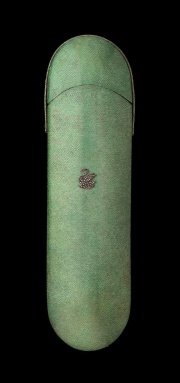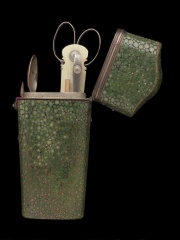Difference between revisions of "Shagreen"
Jump to navigation
Jump to search
(username removed) |
|||
| (3 intermediate revisions by 2 users not shown) | |||
| Line 1: | Line 1: | ||
| − | [[File:63.1071-SC25129.jpg|thumb|]] | + | [[File:63.1071-SC25129.jpg|thumb|Eyeglass case<br>MFA# 63.1071]] |
== Description == | == Description == | ||
| − | A [ | + | A [[leather|leather]] with a rough, granulated surface. Shagreen was originally made in the near East from donkey, mule, or horse skin. It was artificially grained by pressing small, hard [[goosefoot%20seed|goosefoot seeds]] (''Chenopodium album'') into the surface. The skins were trampled then left in the sun to dry. The embedded seeds formed indentations in the dried skins while the seed oils aided in the tanning process. By the late 17th century, the name shagreen was also used for [[galuchat%20leather|Galuchat leather]], tanned skins from sharks and rays, probably because both had a pebbly surface and were often dyed green. Shagreen leather was used for clothing, boots, sword hilts, pistol covers, and book bindings. |
| − | [[File:54.1354-SC25128.jpg|thumb|]] | + | [[File:54.1354-SC25128.jpg|thumb|Scissors case<br>MFA# 54.1354]] |
== Synonyms and Related Terms == | == Synonyms and Related Terms == | ||
sagri; sogri; chagrin (Fr.); Schagren (Deut.); siejgrin (Ned.); chagrain | sagri; sogri; chagrin (Fr.); Schagren (Deut.); siejgrin (Ned.); chagrain | ||
| − | == | + | == Resources and Citations == |
| − | + | * J.Gopfrich, "The Granulated Donkey? Shagreen; Some Aspects of Conservation" in ICOM Preprints, Lyon, 1999. p. 685-690. | |
| − | J.Gopfrich, "The Granulated Donkey? Shagreen; Some Aspects of Conservation" in ICOM Preprints, Lyon, 1999. p. 685-690. | ||
| − | |||
| − | |||
| − | |||
* G.S.Brady, ''Materials Handbook'', McGraw-Hill Book Co., New York, 1971 Comment: p. 704 | * G.S.Brady, ''Materials Handbook'', McGraw-Hill Book Co., New York, 1971 Comment: p. 704 | ||
| − | |||
* Matt Roberts, Don Etherington, ''Bookbinding and the Conservation of Books: a Dictionary of Descriptive Terminology'', U.S. Government Printing Office, Washington DC, 1982 | * Matt Roberts, Don Etherington, ''Bookbinding and the Conservation of Books: a Dictionary of Descriptive Terminology'', U.S. Government Printing Office, Washington DC, 1982 | ||
| − | + | * Wikipedia: http://en.wikipedia.org/wiki/Shagreen (Accessed Nov. 9, 2005) | |
| − | * Wikipedia | ||
| − | |||
* Tom Rowland, Noel Riley, ''A-Z Guide to Cleaning, Conserving and Repairing Antiques'', Constable and Co., Ltd., London, 1981 | * Tom Rowland, Noel Riley, ''A-Z Guide to Cleaning, Conserving and Repairing Antiques'', Constable and Co., Ltd., London, 1981 | ||
Latest revision as of 10:23, 5 September 2024
Description
A Leather with a rough, granulated surface. Shagreen was originally made in the near East from donkey, mule, or horse skin. It was artificially grained by pressing small, hard goosefoot seeds (Chenopodium album) into the surface. The skins were trampled then left in the sun to dry. The embedded seeds formed indentations in the dried skins while the seed oils aided in the tanning process. By the late 17th century, the name shagreen was also used for Galuchat leather, tanned skins from sharks and rays, probably because both had a pebbly surface and were often dyed green. Shagreen leather was used for clothing, boots, sword hilts, pistol covers, and book bindings.
Synonyms and Related Terms
sagri; sogri; chagrin (Fr.); Schagren (Deut.); siejgrin (Ned.); chagrain
Resources and Citations
- J.Gopfrich, "The Granulated Donkey? Shagreen; Some Aspects of Conservation" in ICOM Preprints, Lyon, 1999. p. 685-690.
- G.S.Brady, Materials Handbook, McGraw-Hill Book Co., New York, 1971 Comment: p. 704
- Matt Roberts, Don Etherington, Bookbinding and the Conservation of Books: a Dictionary of Descriptive Terminology, U.S. Government Printing Office, Washington DC, 1982
- Wikipedia: http://en.wikipedia.org/wiki/Shagreen (Accessed Nov. 9, 2005)
- Tom Rowland, Noel Riley, A-Z Guide to Cleaning, Conserving and Repairing Antiques, Constable and Co., Ltd., London, 1981

